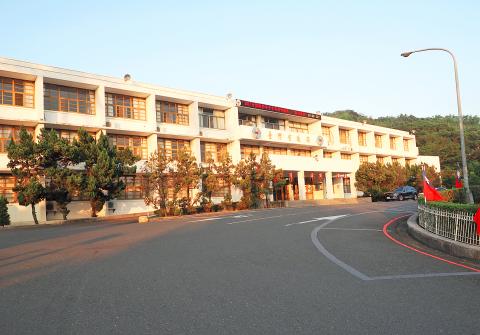Provincial-level agencies will no longer be funded from next year, Executive Yuan deputy spokesman Ting Yun-kung (丁允恭) confirmed yesterday, quoting Premier William Lai (賴清德).
The three agencies are the Fujian Provincial Government, the Taiwan Provincial Government and the Taiwan Provincial Consultative Council.
To better utilize the nation’s resources and improve administrative effectiveness, funding for the three agencies is to be stopped, Lai was quoted as saying.

Photo: Chen Fong-li, Taipei Times
The agencies’ employees and tasks are to be reassigned to the National Development Council and several government ministries from Sunday, he said.
Although there would no longer be any provincial-level tasks next year, there would still be a Taiwan Provincial governor and a Taiwan Provincial Consultative Council chairperson, because the agencies are required by the Constitution and cannot be abolished, Executive Yuan spokesman Hsu Kuo-yung (徐國勇) said.
The Cabinet would assign the position of governor to a minister without portfolio, who would not receive an additional salary for the role, Hsu said, adding that the council would be responsible for maintaining the Taiwan Provincial Government’s buildings.
Nantou County’s Jhongsing New Village (中興新村) — where the Taiwan Provincial Government is based — is well-equipped with various facilities and convenient transportation, Lai said.
After the streamlining of the Taiwan Provincial Government, many people expressed the hope that the central government would reinvigorate the village, because it had not been put to good use, with some parts even left unused, Lai said.
The council is next month to establish an office tasked with reinvigorating the village, Lai said, adding that he has also asked the Directorate-General of Personnel Administration look at transferring Cabinet employees to the area.
The Executive Yuan’s announcement reaffirmed remarks by Taiwan Provincial Governor Wu Tze-cheng (吳澤成) last month at a committee meeting at the Legislative Yuan.
While the Cabinet has not specified how much the government would save from cutting funding to the three agencies, New Power Party Legislator Freddy Lim (林昶佐) in March said it would save NT$300 million (US$9.81 million) per year, citing his own investigation.
Additional reporting by Sean Lin

US President Donald Trump yesterday announced sweeping "reciprocal tariffs" on US trading partners, including a 32 percent tax on goods from Taiwan that is set to take effect on Wednesday. At a Rose Garden event, Trump declared a 10 percent baseline tax on imports from all countries, with the White House saying it would take effect on Saturday. Countries with larger trade surpluses with the US would face higher duties beginning on Wednesday, including Taiwan (32 percent), China (34 percent), Japan (24 percent), South Korea (25 percent), Vietnam (46 percent) and Thailand (36 percent). Canada and Mexico, the two largest US trading

AIR SUPPORT: The Ministry of National Defense thanked the US for the delivery, adding that it was an indicator of the White House’s commitment to the Taiwan Relations Act Deputy Minister of National Defense Po Horng-huei (柏鴻輝) and Representative to the US Alexander Yui on Friday attended a delivery ceremony for the first of Taiwan’s long-awaited 66 F-16C/D Block 70 jets at a Lockheed Martin Corp factory in Greenville, South Carolina. “We are so proud to be the global home of the F-16 and to support Taiwan’s air defense capabilities,” US Representative William Timmons wrote on X, alongside a photograph of Taiwanese and US officials at the event. The F-16C/D Block 70 jets Taiwan ordered have the same capabilities as aircraft that had been upgraded to F-16Vs. The batch of Lockheed Martin

GRIDLOCK: The National Fire Agency’s Special Search and Rescue team is on standby to travel to the countries to help out with the rescue effort A powerful earthquake rocked Myanmar and neighboring Thailand yesterday, killing at least three people in Bangkok and burying dozens when a high-rise building under construction collapsed. Footage shared on social media from Myanmar’s second-largest city showed widespread destruction, raising fears that many were trapped under the rubble or killed. The magnitude 7.7 earthquake, with an epicenter near Mandalay in Myanmar, struck at midday and was followed by a strong magnitude 6.4 aftershock. The extent of death, injury and destruction — especially in Myanmar, which is embroiled in a civil war and where information is tightly controlled at the best of times —

China's military today said it began joint army, navy and rocket force exercises around Taiwan to "serve as a stern warning and powerful deterrent against Taiwanese independence," calling President William Lai (賴清德) a "parasite." The exercises come after Lai called Beijing a "foreign hostile force" last month. More than 10 Chinese military ships approached close to Taiwan's 24 nautical mile (44.4km) contiguous zone this morning and Taiwan sent its own warships to respond, two senior Taiwanese officials said. Taiwan has not yet detected any live fire by the Chinese military so far, one of the officials said. The drills took place after US Secretary